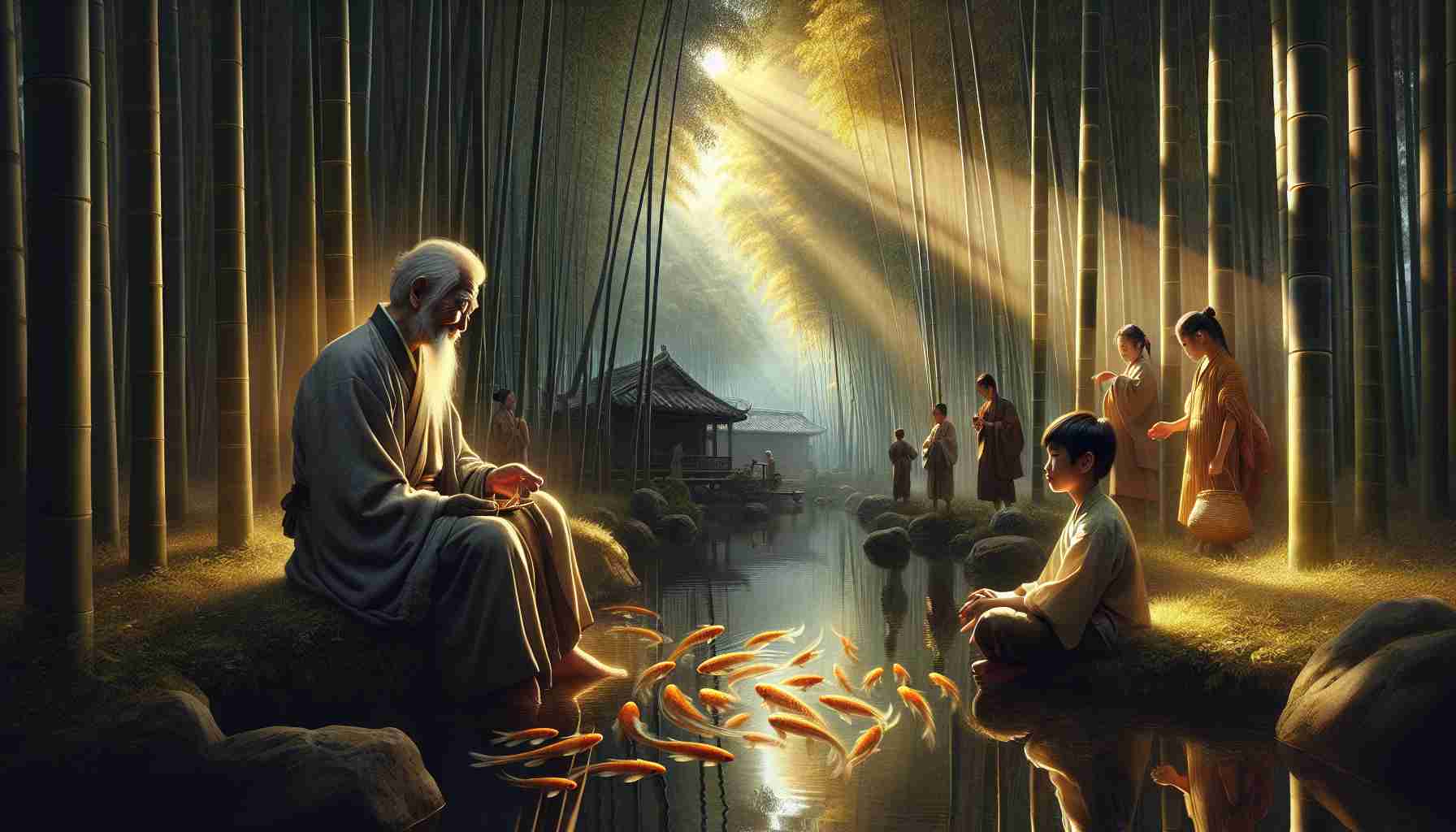

The cicadas buzzed loudly in the trees above me as I trudged down the dusty path, sweat sticking my shirt to my back. I was thirteen, and I was tired of chores and rules. My father always said, “Things grow in silence, son.” But I didn’t want to wait for things to grow—I wanted to make them happen.
That’s why I ran off that morning. I told myself I was going to find a better way to live—a faster way. I wandered until I came to a quiet village hidden by tall bamboo. The air smelled like tea and earth. I had never been there before. I thought I was lost, but somehow, it felt... welcoming.
An old man sat near the pond, feeding small fish crumbs from his hand. He wore a simple gray robe and breathed like each moment mattered. When he looked up, his eyes were soft but sharp, like he could see everything.
“You don’t look like you’re from here,” he said.
“I’m not,” I sniffed. “I’m trying to do something important with my life.”
He smiled gently. “And how will you do that?”
“By working harder than anyone else,” I said. “By pushing, building, thinking all the time.”
The man didn’t laugh or scold me. He just said, “Follow me.”
We walked slowly through the village. Chickens wandered freely. Children played in the dirt. There wasn't a single loud voice or busy machine. I asked what people here did for work.
“We farm, cook, build, and rest,” he said. “All in their time.”
“But how do you grow?” I asked.
He stopped by a tree and motioned for me to sit. “Do trees hurry to bloom?” he asked.
“No…”
“Does the river force its way down the mountain?”
“No, but it gets there.”
He nodded. “We follow the Tao,” he said. “It’s the Way of nature. When we stop pushing and listen, life begins to unfold on its own.”
I didn’t understand fully, but I liked sitting there. The breeze touched my face gently. The silence seemed full of music I had never noticed before.
We sat for a long time. Just breathing. Watching.
I stayed in the village for two days. On the third morning, I woke early to leave. The old man handed me a cup of tea and said, “Doing less doesn’t mean doing nothing. It means doing only what is needed—and allowing room for life to breathe.”
“Like Wu Wei,” I whispered. I had heard that word once—Non-Action.
He smiled, “Yes. Like water that moves without effort, yet shapes the hardest stone.”
When I returned home, I found the same fields, the same chores—but I had changed. I didn’t rush. I breathed. I worked gently.
And slowly, life became lighter.
I didn’t change overnight. But now, when I feel the need to force things, I remember the quiet village, the fish in the pond, and the old man who taught me to trust the Way.
The cicadas buzzed loudly in the trees above me as I trudged down the dusty path, sweat sticking my shirt to my back. I was thirteen, and I was tired of chores and rules. My father always said, “Things grow in silence, son.” But I didn’t want to wait for things to grow—I wanted to make them happen.
That’s why I ran off that morning. I told myself I was going to find a better way to live—a faster way. I wandered until I came to a quiet village hidden by tall bamboo. The air smelled like tea and earth. I had never been there before. I thought I was lost, but somehow, it felt... welcoming.
An old man sat near the pond, feeding small fish crumbs from his hand. He wore a simple gray robe and breathed like each moment mattered. When he looked up, his eyes were soft but sharp, like he could see everything.
“You don’t look like you’re from here,” he said.
“I’m not,” I sniffed. “I’m trying to do something important with my life.”
He smiled gently. “And how will you do that?”
“By working harder than anyone else,” I said. “By pushing, building, thinking all the time.”
The man didn’t laugh or scold me. He just said, “Follow me.”
We walked slowly through the village. Chickens wandered freely. Children played in the dirt. There wasn't a single loud voice or busy machine. I asked what people here did for work.
“We farm, cook, build, and rest,” he said. “All in their time.”
“But how do you grow?” I asked.
He stopped by a tree and motioned for me to sit. “Do trees hurry to bloom?” he asked.
“No…”
“Does the river force its way down the mountain?”
“No, but it gets there.”
He nodded. “We follow the Tao,” he said. “It’s the Way of nature. When we stop pushing and listen, life begins to unfold on its own.”
I didn’t understand fully, but I liked sitting there. The breeze touched my face gently. The silence seemed full of music I had never noticed before.
We sat for a long time. Just breathing. Watching.
I stayed in the village for two days. On the third morning, I woke early to leave. The old man handed me a cup of tea and said, “Doing less doesn’t mean doing nothing. It means doing only what is needed—and allowing room for life to breathe.”
“Like Wu Wei,” I whispered. I had heard that word once—Non-Action.
He smiled, “Yes. Like water that moves without effort, yet shapes the hardest stone.”
When I returned home, I found the same fields, the same chores—but I had changed. I didn’t rush. I breathed. I worked gently.
And slowly, life became lighter.
I didn’t change overnight. But now, when I feel the need to force things, I remember the quiet village, the fish in the pond, and the old man who taught me to trust the Way.